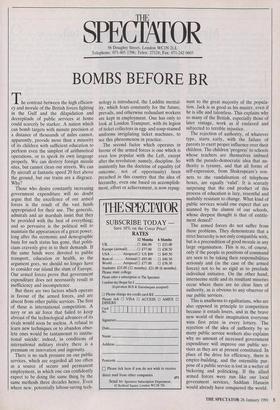SPECTAT THE OR
56 Doughty Street, London WC1N 2LL Telephone: 071-405 1706; Telex: 27124; Fax: 071-242 0603
BOMBS BEFORE BR
Those who desire constantly increasing government expenditure will no doubt argue that the excellence of our armed forces is the result of the vast funds appropriated for their use. The generals, admirals and air marshals insist that they be provided with the best of everything; and so pervasive is the political will to maintain the appearances of a great power, long after the economic and demographic basis for such status has gone, that politi- cians cravenly give in to their demands. If the same funds were devoted to public transport, education or health, so the argument goes, we should no longer have to consider our island the slum of Europe. Our armed forces prove that government expenditure does not necessarily result in inefficiency and incompetence.
But there are two factors which operate in favour of the armed forces, and are absent from other public services. The first of these is international competition. A navy or an air force that failed to keep abreast of the technological advances of its rivals would soon be useless. A refusal to learn new techniques or to abandon obso- lete ones would be tantamount to institu- tional suicide: indeed, in conditions of international military rivalry there is a premium on innovation and ingenuity. There is no such pressure on our public services, which are regarded all too often as a source of secure and permanent employment, in which one can confidently expect to be doing the same thing by the same methods three decades hence. Even where new, potentially labour-saving tech- nology is introduced, the Luddite mental- ity, which fears constantly for the future, prevails, and otherwise redundant workers are kept in employment. One has only to look at London Transport, with its legion of ticket collectors in egg- and soup-stained uniforms invigilating ticket machines, to see this phenomenon in practice.
The second factor which operates in favour of the armed forces is one which is even less popular with the Left, except after the revolution: namely, discipline. So insistently has the doctrine of equality (of outcome, not of opportunity) been preached in this country that the idea of hierarchy, even one based on accomplish- ment, effort or achievement, is now repug- nant to the great majority of the popula- tion. Jack is as good as his master, even if he is idle and talentless. This explains why so many of the British, especially those of later vintage, work as if enslaved and subjected to terrible injustice.
The rejection of authority, of whatever type, starts early, with the failure of parents to exert proper influence over their children. The children 'progress' to schools whose teachers are themselves imbued with the pseudo-democratic idea that au- thority is tyranny, and that all forms of self-expression, from Shakespeare's son- nets to the vandalisation of telephone boxes, are equally 'valid'. It is scarcely surprising that the end product of this process of education is lazy, resentful and mulishly resistant to change. What kind of public services would one expect that are manned by the alumni of our schools, whose deepest thought is that of entitle- ment denied?
The armed forces do not suffer from these problems. They demonstrate that a strict hierarchy is not only compatible with, but is a precondition of good morale in any large organisation. This is so, of course, only if the people in positions of command are seen to be taking their responsibilities seriously and (in the case of the armed forces) not to be so rigid as to preclude individual initiative. On the other hand, internecine strife and its resultant miseries occur where there are no clear lines of authority, as is obvious to any observer of our public services.
This is anathema to egalitarians, who are also opposed in principle to competition because it entails losers, and in the brave new world of their imagination everyone wins first prize in every lottery. The rejection of the idea of authority by so many public service workers also explains why no amount of increased government expenditure will improve our public ser- vices as they are at present constituted. In place of the drive for efficiency, there is empire-building, and the ostensible pur- pose of a public service is lost in a welter of bickering and politicking. If the allied armed forces were run like our local government services, Saddam Hussein would already have conquered the world.


























































 Previous page
Previous page